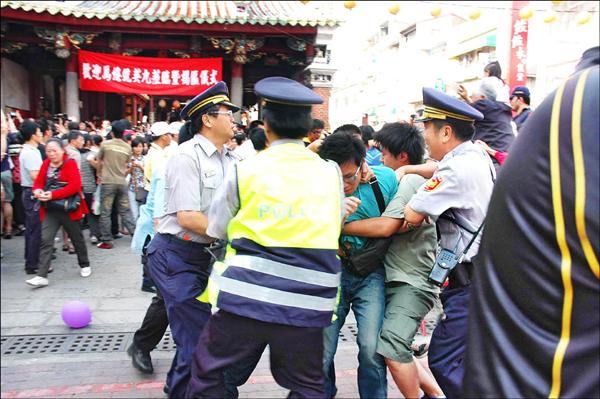Taiwan: Controversy over Chinese University Enrollment

Police officers tackle a group of five college students protesting against the opening up of Taiwanese universities to Chinese students at a temple ceremony where President Ma Ying-jeou was speaking on May 3rd. (Source: Liberty Times, Tsai Wen-chu)
One of the main ideas of Taiwan President Ma Ying-jeou’s rapprochement strategy towards the People’s Republic of China (PRC) is that increasing civilian exchanges between the two sides will promote greater understanding, build trust, and decrease the likelihood of armed conflict. In the past, Ma has often advocated the idea of allowing Chinese students to enroll in Taiwanese universities. Last week, his administration attempted to take a step closer towards making this a reality, but the opposition Democratic Progressive Party (DPP) - which has a small minority in the Legislature - resorted to obstructive tactics to keep this from happening.
Opponents of this policy fear that the Chinese government would exploit this to extend their influence in Taiwan. Some students in Taiwan also fear that they would face almost impossible competition for both university admission and jobs after graduation. An editorial in the Liberty Times, one of Taiwan’s leading newspapers, expresses a common fear amongst Taiwan independence supporters:
[Chinese students] will occupy educational resources for local students, or some among them may have political directives to supervise the speech of professors or develop spy networks. What is even more worthy of concern is that these Chinese students who are close to the marrying age and have lived in Taiwan for an extended period of time would engage in close relations with local students. This would greatly increase the probability of marriage and accomplish President Ma’s plan: to quickly allow young people between the two sides to become friends. At that time, the presence of this increasing number of Chinese spouses in Taiwan will complicate the existing problems of residence and employment for this group.
Supporters of the policy to allow students from China to study in Taiwan feel that this would alleviate the problem of a domestic over-supply of college and university seats. An editorial in the China Times, a pro-unification newspaper in Taiwan, puts forth the argument for engagement:
If Taiwan is scared of anything, it’s China. There is only one term that can be used to describe this fear: meaningless. Taiwan has always sought to learn from the United States. Why can’t it learn from America’s foreign student policy? After opening its arms to the world, people who go to the U.S. to study and stay behind to work end up serving America. This is very good. Those who return to their home countries become a pro-U.S. force. Even better. Human talent has always been an extension of a nation’s borders and influence. Taiwan does not need to block its sons and daughters from going to school on the mainland in the same way that no one thinks that there is anything wrong with studying abroad in the United States, England, or Japan. Taiwan also does not need to block mainland youth from coming to Taiwan to study. As long as they have an interest, they should be welcomed. Starting from the youth, cross-strait academic exchanges will promote greater mutual understanding and friendliness. Human talent is not like agricultural products which need to be protected. What it needs, instead, is competition. There is no way to stop the greater trend towards cross-strait exchanges. A fear of mainland educational credentials will only stunt Taiwan’s competitiveness.
In the end, there is merit to both sides of the debate. While the Liberty Times editorial takes on a shrill nativist tone, the Chinese Communist Party (CCP) does, indeed, have an entire government agency called the United Front Work Department that is devoted to extending China’s influence throughout Taiwan’s political, business, civilian, and academic sectors of society. These “united front tactics,” as they are known, have already been successful at exerting leverage over Taiwanese businessmen operating in China, as well as engaging their one-time Nationalist (KMT) rivals in undermining the previous DPP administration. No matter how warm relations between the two sides become, the ultimate goal of the CCP government remains to subsume Taiwan’s sovereignty under the PRC.
A true resolution of the cross-strait stand-off can only occur when either side changes their fundamental view of their concept of national sovereignty. Now with this opening up in cross-strait exchanges, will Taiwan be able to change China? Or will it be China that changes Taiwan? The Ma administration is purportedly betting on the former, but so far events appear to pointing towards the latter.



